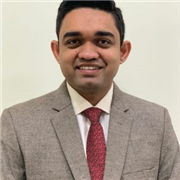
Mr. Priyank Mishra
IAS Officer
DM, Katni, MP
How effective was social media in tackling Covid-19?
It was quite useful and effective. We made the most of social media platforms in reaching out to the needy, creating awareness and addressing critical gaps in our fight against Covid-19 during its first and second waves. Even the common people were benefitted from social media during the trying times caused by Covid-19 waves. We have WhatsApp groups at block level to monitor any situation arising out of the pandemic. Thanks to social media, we have been able to engage multiple stakeholders in our pursuits to good governance. In fact, social media has now become an important tool for good governance.
During a pandemic, fake news makes the going tough. How did you use social media platforms to counter the flow of fake information?
A very good point, indeed! It was of immense help. Rumour mongers get more active when you are faced with an unforeseen kind of situation. They wish to serve their own vested interests by misguiding the people. We used social media platforms quite extensively in countering fake news and ensuring that people have access to correct information regarding Covid-19 beds, vaccination, testing and other health related issues. We also used social media platforms to make sure that people do not suffer on account of other reasons.
Any specific instance where you might have had a great sense of fulfillment while helping the needy thanks to social media?
There are many. As a part of bureaucracy, we are under obligation to serve the people under all circumstances. We do not do any favour to serve them. It is our call of duty. Still there are instances when we are not able to reach the needy. During Covid-19 pandemic induced lockdowns, we used to get many -- Save Our Soul – (SOS) messages on social media platforms. We immediately responded to them, which I found quite fulfilling. It was and even remains now my endeavour to ensure that the administration reaches every needy person in need of our help. That is what India’s ‘Steel Frame’ is all about.
What are the lessons we need to learn from Covid-19? What should be our preparedness for future challenges like the third wave of Covid-19 or so on?
Public sector health has to be an area of our priority now. Health centres and other mechanisms have to be fine-tuned to respond to any situation. Planning has to be well beyond a District and a State. Every crisis makes you learn and unlearn many things. Covid-19 has taught us why we need to have a holistic approach towards public healthcare facilities right from primary to tertiary care. We should have some facilities which are well-equipped to deal with a Covid-19 like situation. So far as the third wave of Covid-19 is concerned, we are fully geared up to respond to any eventuality. Our awareness programmes are going on. A lot of emphasis is being laid on Covid-19 appropriate behaviour. Tracing, testing and treating are going on.
You created a 200-bed Covid-19 care centre in 48 hours. You also ensured 100 per cent vaccination in Bamhauri village when there was so much hesitancy among the people for vaccination.
There was a spontaneous flow of support from all stakeholders. We engaged them in every respect which paid off well. Residents of Bamhauri village came forward for vaccination, sending out a strong message to others that they should also come forward and join India’s fight against the coronavirus. Similarly, the Covid-19 health facility called Divyanchal was built in 48 hours thanks to the help of all stakeholders, civil society and NGOs. Our concerted efforts proved quite useful. I do take pride in the fact that Bamhauri village set an example in the entire State at a time when people in rural areas were not coming forth for vaccination. Due credit must also be given to our health, revenue, panchayat and other department officials as they are working round the clock to ensure effective Covid-19 management.
What are the areas of focus now?
Our approach is multi-pronged. From spreading positivity to ensuring 100 per cent vaccination in urban and rural areas, we are working with all stakeholders. In rural areas, we are involving Gram Panchayats and youths – who are also our ambassadors – to ensure that every eligible person gets vaccinated. We have identified high risk areas and vulnerable sections so that we firmly handle any situation. We are encouraging those who have been vaccinated to act as ambassadors to convince their kith and kin for vaccination. Things are well in place to deal with any situation efficiently.
|